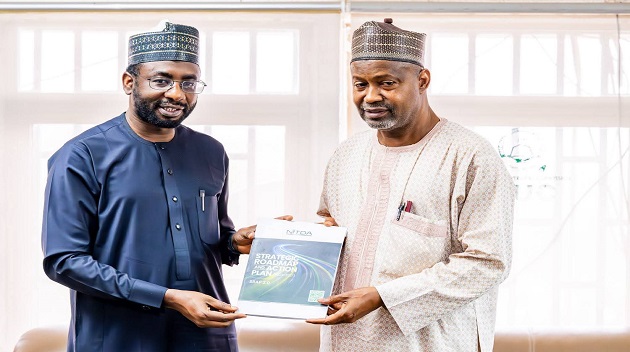News
NITDA, NUC Strengthen Partnership to Implement Digital Literacy and Skills Curriculum

The National Information Technology Development Agency (NITDA) and the National Universities Commission (NUC) have renewed their commitment to implementing the Digital Literacy and Skills Curriculum across all Nigerian universities.

This was announced during the Director General of NITDA, Kashifu Inuwa and his management team visit to the National Universities Commission (NUC), where they engaged with the newly appointed Executive Secretary, Professor Abdullahi Yusufu Ribadu.
The visit provided an opportunity to reignite the implementation of this ambitious initiative, which was agreed upon during the initial visit in December 2024, and to reinforce the commitment of both organisations toward integrating digital literacy into Nigeria’s higher learning institutions.
During the meeting, Inuwa emphasised that human capital development is at the heart of national progress, and that there is need to reform Nigeria’s education system by reviewing university curricula to incorporate digital skills and emerging technologies such as Artificial Intelligence (AI), Blockchain, Internet of Things ((IoT) Cloud computing, and Cybersecurity.
He said, “With the rapid advancement of technology, digital skills have become a necessity for success in today’s workforce. This collaboration is a strategic move to equip Nigerian students with the competencies needed to thrive in a technology-driven world, enhancing job creation, entrepreneurship, and overall economic resilience.
“We must review the school curriculum to embed digital literacy and skills, ensuring that our graduates are not just degree holders but are equipped with the necessary competencies to thrive in a technology-driven world. Education reform is critical, and implementing this curriculum across all universities will be a game-changer in our nation’s development,” Inuwa stated.
This partnership aligns and NITDA’s Strategic Roadmap and Action Plan (SRAP 2.0), underscoring the critical role of digital literacy in preparing the nation’s youth for the future.
He further stressed the initiative aligns with President Bola Ahmed Tinubu’s administration priorities of reforming the economy to deliver sustained inclusive growth, and accelerating diversification through industrialization, digitization, creative arts, manufacturing and innovation.
Inuwa added that empowering young Nigerians with digital knowledge would drive economic transformation by creating a workforce that is innovative, entrepreneurial, and ready to meet the challenges of the modern economy.
Professor Ribadu, in his response, reaffirmed NUC’s unwavering commitment to the full implementation of the Digital Literacy and Skills Curriculum, emphasisng the Commission’s dedication to fostering innovation and digital transformation within the higher education sector.
He commended NITDA for its leadership in driving Nigeria’s digital agenda and assured that NUC would work closely with the agency to ensure seamless integration of the initiative into university curricula nationwide.
He acknowledged that digital education is central to Nigeria’s vision of becoming a leading knowledge-based economy and pledged to facilitate necessary policy adjustments to support this goal.
The collaboration between NITDA and NUC will involve a structured implementation plan, capacity-building programmes for educators, and the deployment of digital infrastructure to facilitate seamless adoption. Universities will also be encouraged to incorporate emerging technologies into their curricula, ensuring students are equipped with skills that align with global industry standards.
The initiative is also expected to bridge the digital divide, ensuring that students from all backgrounds, including those in rural and underserved areas, have access to quality digital education.
As technology continues to reshape industries and societies worldwide, Nigeria’s investment in digital literacy will serve as a catalyst for long-term socio-economic transformation.
With strong commitment from both NITDA and NUC, the implementation of the Digital Literacy and Skills Curriculum will mark a new era in Nigeria’s education sector, fostering a generation of tech-savvy graduates who are well-prepared to drive the nation’s digital economy forward.
News
Tech Executives Double Down on AI, Talent and Adaptive Strategies to Lead in the Intelligence Age

KPMG’s Global Tech Report 2026 reveals that organisations worldwide are moving beyond pilots and seeking to embed AI into core workflows and offerings, striving to scale investments. The new report identifies that while expectations are high and adoption is rapid; scaling can introduce additional complexity and returns vary widely.

- 68 percent of organisations surveyed aim to reach the highest level of AI maturity by the end of 2026, yet only 24 percent are there today.
- 88 percent are investing in building agentic AI into their systems.
- 74 percent say their AI use cases are delivering business value, but only 24 percent achieve ROI across multiple use cases.
- 90 percent plan to grow partnerships and tech ecosystems over the next year, yet 53 percent still lack the talent needed to bring their digital transformation plans to life.
- 78 percent agree they must take more risks on emerging technologies to stay relevant.
The report asks: Can ambition match reality, and can organisations keep one eye on the next wave of innovation while delivering on today’s agenda?
“The future belongs to leaders who turn intelligence into advantage. Our research shows organisations are pushing past the early phase of ‘AI roulette’, placing scattered bets on multiple technologies, and are now increasingly focused on delivering value. When ambition meets disciplined execution, value compounds.
“Our 2026 Global Tech Report provides a synopsis of the critical things that high performers are doing better than most; a checklist for tech leaders looking to improve their organisational performance, emulate the high performers, and deliver higher ROI”. – Guy Holland, Global Leader, CIO Center of Excellence, KPMG International
”As Africa enters the Intelligence Age, the differentiator is no longer access to technology, but the ability to build the skills, governance, and operating models required to scale it responsibly. While organisations are accelerating AI adoption to drive productivity and growth, the real determinant of value lies in workforce readiness, executive alignment, and disciplined execution.
Those that invest early in digital skills, human-AI collaboration, and adaptive leadership will be best positioned to translate innovation into sustainable commercial and economic impact.” – Marshal Luusa, Partner: Technology & Innovation Lead, KPMG One Africa
Key findings from the report
Tech maturity accelerates: Leaders set their sights on the top
Half (50 percent) of global tech leaders surveyed expect to reach the highest level of technology maturity in 2026, compared to only 11 percent today. This surge in optimism is fuelled by a move from isolated experiments to integrating AI and advanced technologies into core systems and scaling their impact.
High performers, those organisations leading in technology maturity, process maturity and value, are already reaping the rewards, reporting an average ROI of 4.5x, more than double the industry average of 2x. These leading organisations have progressed beyond pilot programs, prioritising the scaling of innovation and continually adapting to maintain a competitive edge in a fast-evolving environment.
Other organisations reporting higher ROI include smaller firms (3.6x), those with fewer cost pressures (2.6x), and transformation‑focused organisations (3.2x). The ROI pattern is equally nuanced: rather than a single investment ‘sweet spot’, clear ROI ‘zones’ emerge, from early quick wins to accelerating, enterprise‑wide value as maturity increases.
The age of agentic: AI adoption surges but innovation drives real business value
AI is now seen as a strategic necessity, not just industry hype. Sixty-eight percent of respondents are aiming for the highest level of AI maturity in their organisations. Eighty-eight percent of companies are already investing in agentic AI – autonomous digital agents transforming operations and decision-making. Seventy-four percent of respondents report that their AI initiatives are creating measurable business value, such as improved efficiency and reduced risk.
However, only 24 percent say they are scaling AI and achieving ROI across multiple use cases. This highlights the need for organisations to evolve KPIs beyond traditional financial and productivity metrics and build enterprise-wide alignment to fully realise AI’s potential.
The shift from AI experimentation to large-scale deployment is underway, with leaders working to embed AI into products, services, and value delivery.
Talent and agility power success: Human potential remains central
Human expertise remains central to digital transformation initiatives. Organisations are making significant investments in upskilling their workforce, building adaptive teams, and fostering cultures that embrace change.
Despite the rapid adoption of agentic AI, organisations still expect 42 percent of their tech workforce to remain permanent human staff by 2027 – only a five‑point drop from 2025.
High-performing companies plan to retain even more permanent human talent, with 50 percent remaining in place by 2027, revealing the continued importance of human expertise alongside AI. Despite these efforts, 53 percent of organisations report they still lack the talent needed to realise their digital transformation strategies.
Ninety-two percent of organisations surveyed anticipate that managing AI agents will become a critical skill within five years. The most successful organisations prioritise both technological advancements and people, empowering employees to innovate and adapt.
Strategic partnerships fuel growth: Ecosystems expand for the future
To overcome challenges and accelerate learning, 90 percent of organisations plan to grow partnerships and tech ecosystems over the next year. Strategic alliances are enabling access to specialised expertise, rapid innovation, and shared best practices.
As agentic AI and other advanced technologies become mainstream, organisations recognise the importance of building robust ecosystems that foster co-creation and continuous improvement. Nearly one-third of tech executives are planning to increase investment in centers of excellence, supporting cross-functional teams and controlled experimentation.
Preparing for tomorrow’s breakthroughs: Leaders embrace bold risks
The future is arriving fast, with quantum computing and Artificial Superintelligence (ASI) on the horizon. Leaders are already preparing for these breakthroughs, with 78 percent of organisations agreeing they must take more risks on emerging technologies to stay relevant.
The report urges organisations to maintain strategic foresight, invest in ethical frameworks, and build resilient, future-ready workforces. By balancing ambition with rational thinking and disciplined execution, tech executives are positioning their organisations to turn disruption into durable, compounding value.
News
LIRS to Invoke NTAA to Recover Unpaid Taxes from Bank Accounts, Others

Lagos Internal Revenue Service (LIRS) pursuant to Section 60 of the Nigeria Tax Administration Act (NTAA), plans to ask Nigerian banks to debit bank accounts of employers who failed to remit tax liability.

This was disclosed in a recent notice on Sunday.
LIRS stressed that the move was in line with the implementation of the country’s NTAA and other new tax laws, which took effect on January 1, 2026.
“Where a taxpayer fails, neglects, or refuses to settle any established outstanding tax liability when due, LIRS may exercise its power under Section 60 to direct any of the following persons to pay the amount owed by the taxpayer:
“Banks and other financial institutions; Employers; tenants, debtors, or customers of the taxpayer; Agents, business partners, and any person holding money on behalf of the taxpayer; Any person owing money to the taxpayer, whether presently due or accruing. Once a substitution notice is issued, the person served is statutorily required to remit to LIRS the amount. Specified in the notice from funds belonging to, or payable to, the defaulting taxpayer,” the LIRS notice partly read.
Meanwhile, Taiwo Oyedele, chairman of the Presidential Committee on Fiscal Policy and Tax Reforms, weeks ago ruled out claims that the government would debit personal accounts over tax remittances.
News
Anambra Cuts Monday Pay to Kill Sit-at-Home

Anambra State will implement pro-rata salary payments for civil servants starting February 2026, targeting chronic Monday absenteeism from the long-running sit-at-home order, Information Commissioner Dr. Law Mefor announced Saturday.

Soludo
Speaking at an Awka briefing after the Executive Council’s end-of-tenure retreat, Mefor said improved security and transport have eliminated excuses for the four-year disruption, which cost the state trillions in lost revenue. “Workers enjoyed full pay despite staying away; now, no work means no pay for that day, calculated over 24 working days,” he stated.
Compliance measures include mandatory Monday clock-in forms, with markets urged to reopen fully amid bolstered security. This builds on a January 22 executive order docking 20% pay from teachers absent on Mondays.
Mefor warned that lost Mondays cripple revenue collection and productivity, rejecting alternatives like Saturday shifts as capitulation to agitators.

 News1 day ago
News1 day agoAnambra Cuts Monday Pay to Kill Sit-at-Home

 E-Financial1 day ago
E-Financial1 day agoFirst Asset Management Receives Upgraded Ratings from Agusto &Co and DataPro

 General News1 day ago
General News1 day agoNigeria Treats Religious Violence as Attack on State – NSA Ribadu

 E-Financial1 day ago
E-Financial1 day agoCBN Prepares Fresh Debit Card Rules to Improve ATM Services

 E-Financial1 day ago
E-Financial1 day agoNIBSS, Others Flag 13,417 Nigerian Fraudsters on Person of Interest Portal

 News1 day ago
News1 day agoLIRS to Invoke NTAA to Recover Unpaid Taxes from Bank Accounts, Others

 E-Business6 hours ago
E-Business6 hours agoFirm Identifies AI as Common Denominator in Entertainment Industry’s 2026 Security Threats

 General News6 hours ago
General News6 hours agoWEBINAR: Techeconomy Business Series Hosts Experts from MTN, Interswitch, BusinessPlus, others this Wednesday

























